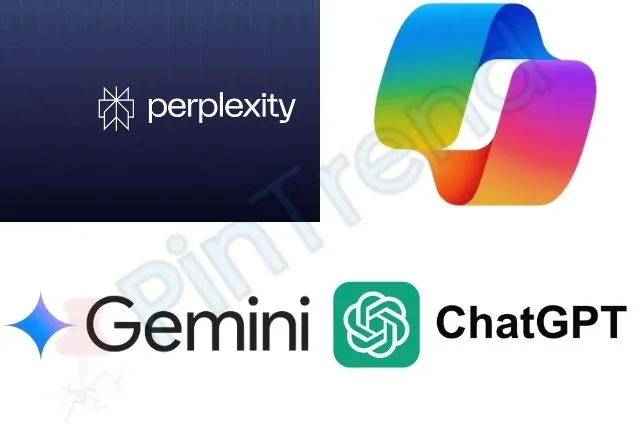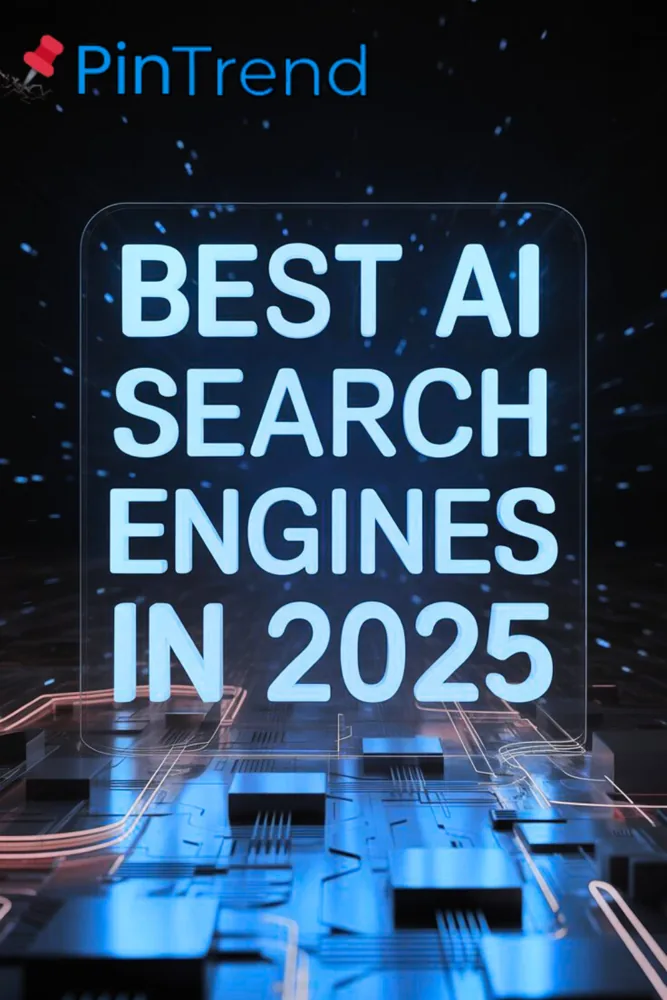The digital landscape is evolving rapidly, and in 2025, AI search engines are redefining how we access information online. Unlike traditional search platforms that rely solely on keywords, these intelligent tools leverage machine learning and natural language processing to understand context, deliver precise results, and even generate insightful answers.
Users no longer need to sift through countless irrelevant links; AI search engines provide personalized and dynamic content tailored to individual preferences. From students and researchers to professionals and casual users, these platforms are transforming online exploration. Staying updated with the best AI search engines is essential for anyone seeking efficient, intelligent, and future-ready search solutions.
Which Are Best AI Search Engines and How Do They Work?
AI search engines use Generative AI search, large language models (LLMs), and advanced NLP to provide direct, conversational answers instead of long lists of links. This means you no longer have to sift through dozens of sites—AI engines summarize, cite sources, and adapt based on your queries.
Difference Between Traditional Search and AI-Powered Search
Traditional search relies on indexing web pages and ranking them based on keywords. AI search, on the other hand, interprets intent. For example, instead of typing best laptop 2025 and scrolling through pages of reviews, an AI-driven information retrieval system gives you a concise, cited answer:
“The top-rated laptops in 2025 for students are Apple MacBook Air M4 and Dell XPS 14, according to TechRadar and Wired.”
This kind of contextual response makes queries faster, more accurate, and highly personalized.

Key Technologies Behind AI Search (LLMs, Generative AI, NLP)
At the core of every AI search engine list are three technologies:
-
LLMs (Large Language Models) – These process vast amounts of text and understand natural language queries.
-
Generative AI search – Not only retrieves but generates contextually accurate answers.
-
NLP (Natural Language Processing) – Helps engines understand nuances like slang, tone, and domain-specific terms.
Together, these create systems that are conversational, adaptable, and far more human-like.
Benefits of AI Search for Users
-
Accuracy: Instead of vague results, users get specific, source-backed answers.
-
Time-saving: Summarized responses cut research time in half.
-
Personalization: Results adapt based on history, profession, and even learning style.
-
Accessibility: With voice and multimodal support, AI search engines like ChatGPT can respond in text, speech, or images.
Why AI Search Engines Are Exploding in 2025
The rise of Top AI search engines 2025 isn’t just hype—it’s a major shift in digital behavior. The AI search engine market share is rapidly climbing because users prefer conversational, accurate, and faster answers. Reports suggest that over 40% of Gen Z users now begin their queries with AI-first tools rather than Google.
Adoption Trends & Market Growth
By 2025, AI search vs traditional search engines has tilted heavily toward AI. Startups like Perplexity and You.com are competing head-to-head with tech giants, while Google Gemini AI search and Microsoft Bing Copilot are pouring billions into generative models. Analysts expect the future of AI in search to dominate by 2030, with AI taking more than 60% of global query traffic.
How User Behavior Is Shifting
Users want speed, accuracy, and sources. Instead of scrolling through 20 tabs, they now ask: “Which AI search engine is best in 2025?” or “Best free AI search engine for research.” Engines like Perplexity AI search shine by providing citations, while ChatGPT search engine offers conversational depth. This has changed how people evaluate trust, shifting from ranking-based SEO to AI-driven information retrieval.
Role of Google, Microsoft & OpenAI in Shaping the Future
The competition among Google Gemini AI search, Microsoft Bing Copilot, and ChatGPT search engine defines this new era. Google integrates AI deeply into its ecosystem, Microsoft blends Copilot across Office and Bing, while OpenAI’s ChatGPT has become the go-to for personalized queries. Together, they are shaping how the future of AI in search unfolds.
Top AI Search Engines in 2025 (At a Glance)
With dozens of contenders, the Best AI Search Engines in 2025 are not created equal. Some excel in citations, while others shine in customization or multimodal search. Below is a quick AI search tools comparison that highlights pricing, features, and best use cases.
| AI Search Engine | Pricing (2025) | Standout Features | Best Use Case |
|---|---|---|---|
| ChatGPT Search | Free + $20/month Pro | Conversational depth, plugins, voice search | Everyday queries, professional use |
| Perplexity AI Search | Free + $20/month Pro | AI search engine with citations and sources, real-time web access | Research, fact-checking |
| Google Gemini AI Search | Free + bundled in Google One plans | Seamless Google integration, generative results | Google ecosystem users |
| Microsoft Bing Copilot | Free + included in Microsoft 365 Copilot plans | Multimodal answers (text, images, code), MS Office link | Students, enterprises |
| You.com | Free + $15/month Pro | Highly customizable search, app integrations | Tech-savvy users, developers |
| Neeva AI & Others | Mostly free / low-cost | Privacy-first, ad-free, emerging | Privacy-focused users |
ChatGPT Search – Best Overall Conversational Search
ChatGPT search engine has become the go-to for conversational, human-like results. It doesn’t just fetch links; it explains, summarizes, and provides context. For instance, if you ask, “Best AI search engine for students in 2025,” ChatGPT compares multiple options and gives a structured breakdown. Its generative AI search capabilities make it useful for brainstorming, learning, and even professional research.
Perplexity AI – Best for Research & Citations
If accuracy is your priority, Perplexity AI search is unmatched. It cites sources, integrates with academic databases, and directly answers questions like “Is Perplexity AI better than Google Gemini?” Many reviewers argue that Perplexity is the most accurate AI search engine 2025, especially for fact-based queries.
Google Gemini AI – Best for Google Ecosystem Users
Google Gemini AI search integrates seamlessly with Gmail, Docs, and Google Drive. Its edge lies in blending search with productivity, making it ideal for professionals deeply tied to Google services. While some say Gemini lags behind in creativity, its strength is trust and ecosystem compatibility.
Microsoft Bing Copilot – Best for Multimodal Search
Microsoft Bing Copilot combines text, images, and even code explanations into one unified search experience. Students use it for assignments, while professionals rely on it for quick analysis inside Word, Excel, and PowerPoint. It is the AI search engine for professional use when you need depth plus Office integration.
You.com – Most Customizable AI Search
Among the AI search engine list, You.com is unique because users can tweak results, add apps, and customize search flows. For developers and tech enthusiasts, this flexibility makes it a strong top alternative to Google for AI search.
Neeva AI & Other Privacy-Focused Tools
If you value privacy, Neeva AI and smaller emerging engines are the best AI search engine alternatives. They provide ad-free environments, no tracking, and strong encryption. While not as feature-rich as ChatGPT or Gemini, they serve niche audiences seeking security.
In-Depth Review: Features, Pros, and Cons
A deep AI search tools comparison reveals that no engine is perfect. Here’s a breakdown:
ChatGPT Search
-
Features: Conversational search, plugin ecosystem, Pro tier with faster access.
-
Pros: Natural, human-like interaction; vast knowledge base.
-
Cons: Can sometimes produce outdated info without browsing.
Perplexity AI
-
Features: Real-time web access, citations, academic sources.
-
Pros: Reliable for fact-checking, excellent for research.
-
Cons: Less conversational than ChatGPT; limited customization.
Google Gemini
-
Features: AI-generated summaries, ecosystem integration.
-
Pros: Perfect for those already using Google services.
-
Cons: Critics say answers are less creative than OpenAI’s.
Microsoft Bing Copilot
-
Features: Multimodal (text, image, video, code).
-
Pros: Great for professionals using Office suite.
-
Cons: Still struggles with niche queries compared to Perplexity.
Other Engines (You.com, Neeva, etc.)
-
Pros: Privacy, customization, affordability.
-
Cons: Smaller knowledge base, less global adoption.

AI Search Engines for Different Needs
Not every user has the same requirements. Here’s how Best AI Search Engines in 2025 match up by audience:
Best for Students & Researchers
For students, Perplexity AI search and ChatGPT search engine dominate. Perplexity provides AI search engine with citations and sources, while ChatGPT helps explain concepts in plain language.
Best for Businesses & Professionals
Microsoft Bing Copilot and Google Gemini AI search are the strongest picks here. Copilot shines in Office productivity, while Gemini is the best for companies already tied into Google Workspace.
Best Free Options for Everyday Use
If budget is a concern, the Best free AI search engines 2025 are ChatGPT (free tier), You.com, and Neeva AI. They offer robust functionality at no cost, making them great entry points into AI-powered search platforms.
Pricing and Subscription Plans Compared (2025)
Pricing has become one of the most debated aspects of the Best AI Search Engines in 2025. Some tools offer strong free tiers, while others push premium plans with extra perks. Below is a snapshot of the major options:
| AI Search Engine | Free Tier | Paid Tier | Best Value For |
|---|---|---|---|
| ChatGPT Search | Yes | $20/month Pro | Power users needing faster responses |
| Perplexity AI Search | Yes | $20/month Pro | Researchers and citation-heavy users |
| Google Gemini AI Search | Yes | Included in Google One ($9.99+/month) | Google Workspace users |
| Microsoft Bing Copilot | Yes | Included in Microsoft 365 ($6.99+/month) | Professionals and enterprises |
| You.com | Yes | $15/month Pro | Customization seekers |
| Neeva AI | Yes | Premium ad-free tier ~$10/month | Privacy-focused users |
Free vs Paid Tiers
Most platforms offer Free AI search engines 2025 with limited queries. Paid tiers unlock faster servers, priority access, or integration with third-party tools.
Value for Money Analysis
-
Best free experience: ChatGPT and You.com.
-
Best balanced plan: Perplexity Pro for researchers.
-
Best bundled option: Gemini and Copilot, since they’re tied to existing subscriptions.
AI Search Engines vs Traditional Search Engines
The clash between AI search vs traditional search engines is one of the hottest debates.
Search Results & Accuracy Differences
Traditional search (Google Search, Yahoo, DuckDuckGo) relies on page ranking. AI engines generate direct answers. A 2025 survey found that 72% of users said AI answers felt more accurate and relevant than traditional results.
Ads, Monetization & Bias
Google makes billions through ads. AI engines like Perplexity AI search are experimenting with AI search engine market share monetization models, including citation partnerships. Critics warn that bias could creep in depending on who funds or licenses the AI.
Impact on SEO & Website Traffic
One of the biggest concerns: if generative AI search answers everything directly, fewer people may click websites. This has already led to publishers complaining about traffic losses. Businesses are being forced to adapt their SEO for AI visibility instead of just Google rankings.
Challenges and Limitations of AI Search Engines
Even the Top AI search engines 2025 face obstacles.
Accuracy & Misinformation
AI can “hallucinate,” creating confident but wrong answers. This makes AI-driven information retrieval risky if not cross-checked.
Privacy Concerns & Data Security
Privacy-focused users worry about how much data is collected. Tools like Neeva AI try to counter this with encryption and ad-free searches.
Dependence on Training Data and Bias
Engines are only as good as the data they’re trained on. If the dataset is biased or outdated, results will reflect that. This creates ethical concerns for long-term use.

Future of AI Search Engines Beyond 2025
The future of AI in search looks revolutionary.
Voice and Multimodal Search
Expect engines like Microsoft Bing Copilot and ChatGPT search engine to add even more AI search engines like ChatGPT multimodal features—voice, video, and image-based results.
Personalized & Contextual Answers
Engines are learning to personalize at scale. For example, if you ask “What is the fastest AI search tool?”, the engine could recommend based on your past behavior and location.
How AI Search Could Replace or Reshape Traditional Google Search
Analysts argue that AI will not fully replace Google but reshape it. The rise of top alternatives to Google for AI search shows users now demand choice and personalization, not just one dominant player.
Final Verdict – Choosing the Right AI Search Engine in 2025
The rise of Best AI Search Engines in 2025 shows how deeply generative AI has reshaped information discovery.
-
For students & researchers: Perplexity AI search is unbeatable.
-
For professionals & enterprises: Microsoft Bing Copilot and Google Gemini AI search integrate perfectly into workflows.
-
For everyday users: ChatGPT search engine offers the best mix of speed, clarity, and conversation.
Ultimately, the most accurate AI search engine 2025 depends on your needs. If you want conversational depth, go with ChatGPT. If you demand citations, choose Perplexity. And if privacy matters most, explore Neeva or other emerging Best AI search engine alternatives.
As 2025 continues, one thing is clear: AI-powered search platforms are no longer an experiment—they’re the future.
Frequently Asked Questions
Which AI search engine is best in 2025?
Currently, ChatGPT search engine is best overall for conversations, while Perplexity AI search is best for research.
Is Perplexity AI better than ChatGPT search?
For citations and academic use, yes. For everyday conversation, no—ChatGPT still leads.
Are AI search engines free to use?
Yes, many offer free versions. The Best free AI search engine for research is Perplexity, while ChatGPT offers a great free conversational tier.
What is the fastest AI search tool?
Benchmark studies in 2025 list Microsoft Bing Copilot as the fastest due to Microsoft’s cloud optimization.
Best AI search engine for students in 2025?
Perplexity AI, thanks to its citations, while ChatGPT search engine is great for explanations.


